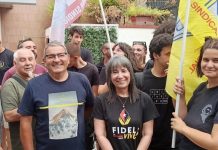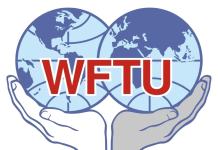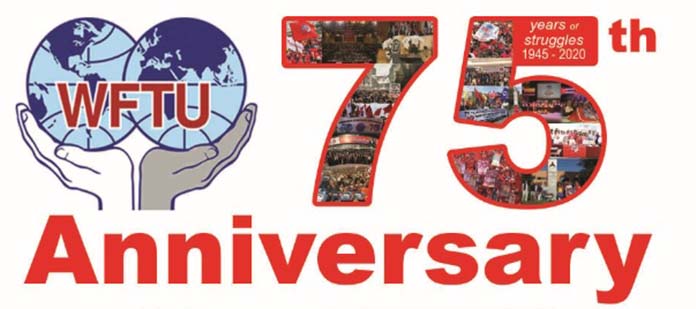In 1955, when the World Federation of Trade Unions (WFTU) remembered its 10th anniversary, a famous French painter Pablo Picaso painted a picture of a flower in bloom, donating it just to that international trade union central in the occasion of its 10th anniversary. Another sixty years have passed, and the WFTU has remembered already 70 years of its history in October 3, 2020. How immensely important anniversary, indeed! The years of revolutionary struggles, of strenuous difficult unification of global trade union movement and of the power’s boom, were replaced with the days of bitter disappointment from betrayal and turncoating during 1990s. The betrayal and the defeat of socialism in European countries brought sour fruits also for this international central. Workers and other working people’s class solidarity, real experiences, determination of trade unions in the countries of Africa, Asia, both Latin and Northern Americas as well as the principled stances of numerous left-wing trade union centrals in Greece, Cyprus, Portugal, Bask country and other countries, prevented this global TU central to be definitely broken. The WFTU, after protracted struggle for its headquarters in Prague has defended successfully its right of international organisation to exist, fighting off the Czechoslovak dissent – the Czech one respectively after later split of Czechoslovakia – but then WFTU Congress took the decision to move the headquarters into Athens, from practical reasons. Currently, our Trade Union Association of Bohemia, Moravia & Silesia (OSČMS) is the only TU central in Czech Republic to be the WFTU’s member.
What were some of historical moments on WFTU’s 70-years-way? First, it is necessary to say that great moments for the trade union movement were May 9, 1945, when the WWII finished in Europe, and September 2, 1945, when Japan signed the unconditial surrender. A new balance of political forces had adumbrated also an important change in balance of forces within the international trade union movement. The trade union movement’s structure changed, the Amsterodam Internationale had fallen apart in fact during the WWII and several attempts to revive it got failed. United trade union organizations, being established in the newly formed block of people’s-democratic countries, took as a pattern the united trade unions in Soviet Union, and they made demands for establishing of a new international trade union organization, rigorously defending not only the workers’ rights, but also of all employees in general. It is the fact, however, that the then representatives of some Brittish trade union centrals, for example, tried to change that trend of following Soviet TUs.
The general meeting was held already in February 6, 1945, in London. 204 delegates participed there, representing about 60 million of workers, from 42 countries. All the matter, however, was everything but simple, and deep contradictions appeared in the issue of Trade Union Internationale’s establishing. The delegates from Latin America’s countries, from USSR, France, Australia, as well as from US’ CIO, demanded to establish a new trade union organization, and they supported the proposals of CIO’s Sidney Hillman. It’s necessary to remark that the CIO was influenced by its very strong left-wing, personifying – given by US habitat – very progressive stances, getting so into open quarrels with the rest of US Trade Union of AFL. Then, Brittish TU leaders set their hopes on revival of decaying reformist TU Central to be established in Amsterodam. Finaly, however, a compromise was reached. 41-members-headed-commission was created, conveying next general meeting, primarily aiming to draw the WFTU Constitution’s proposal.
The WFTU’s founding congress was held from September 25 to October 9, 1945, in Paris. The decision to change the general meeting into congress came there just in October 3, 1945. There were 346 delegates from 56 countires from around the world, representing 67 million workers that time. So, almost all general unions being established and working already before in their respective countries, not occupational ones, participated to establish the WFTU. The US AFL was invited as well; nevertheless, they didn’t attend. Mr. Luis Salant vas elected the founding secretary general. Then Czechoslovakia was represented by 14 head delegates. Cde. Antonín Zápotocký, then Central TU Board’s chairman, was elected a member of WFTU’s Executive Committee for Central European countries. C’des František Zupka & Evžen Erban were elected into WFTU General Board’s broader executive; C’des Otakar Wünsch and František Jugmann were elected the reserves.
Well; what to add to this recollection… Between 1945 and 1989, the WFTU had gradually strengthened, embracing up-to 400 millión working people, mainly the toiling-workers-professions. The WFTU’s role to defend the working class positions, mainly those of workers’ professions. The WFTU’s role is unambiguous when defending the working class’ positions, struggling for eigth-hours-working-day with adequate wages, when striving for a social security and for building of socialism. Moreover, the WFTU has enforced establishing the UN Labour Council.
Nevertheless, how the WFTU was strengthening, attempts to corrupt trade union movement increased, together with efforts to support the reformist trends of the WFTU’s opponents – bourgeois ruling elites, socialist and social-democratic movements, the subjects being politically orientated on Christian-democratic groups. Immediately whwn the cold war had started, after initiatives by US trade union centrals of the AFL-CIO, some unions left the WFTU, founding the International Confederation of Free Trade Unions (ICFTU) at the very beginning of 1950s. The ICFTU remained to be a loyalty tool of the compromise politics, to be greatly indebted to the interests of transnational capital, with the constant symbol of the bourgeous ideology’s propaganda, and, later, for example, with the illusion of Swedish socialism as well as of the social state, with the reformovable “capitalism with human face” and with the almighty role of collective bargaining agreements, and, above all, with the slogan of both the trade unions and the trade union demands to be apolitical. Unfortunately, it osn’t any empty purple patch, but it is a reality instead. Nevertheless, are the demands of eigth-hours-working-day, of the child work to be strictly prohibited, of getting retired in dignity, the apolitical ones? Surely not! The Free Trade Unions themselves, however, passed through the way of sharp inner splitting, seeking for the space to attack the WFTU. The starting point for them should be establishing of World’s Labour Union, but it was still not-numerous-membership organization.
The events from 1990s, especially between 1990 and 1994, have brought a dramatic twist. Due to power turns in European countries, in which the socialism had been buildt before, Free trade unions made plans for a new strategy, determining once again the slogan of treade unions’ politics to be apolitical, braking general unified trade unions into occupational organizations. Nevertheless, we know this history pretty well, too, from our former Czechoslovakia, and, consequently, from Czech Republic as well. Hundreds representatives of transnationals’ managements, strongly supported by then domestic dissent, participated on the junket of breaking of united trade union organized in the WFTU, and, in the same time, they participated on so-called property division. It isn’t necessary to mask that in that situation, the WFTU came up to the limit of its very existence, to the line of its organisation structure to be disbanded. In praxis, it had very negative impact on both the working class and other working people. After all, only in Czechoslovakia itself, and later in Czech Republic, the unions being organized in the Free Trade Unions, which later changed their name into ITUC (with the ETUC as its part), bargained away the trade unionists’, employees’, economical and social rights being gained during past fifty years. That time, the International Labour Council, supported by both the Labour Union and the Free Trade Unions, passed, among other issues, the factual abolition of child work’s ban, the abolition of the womwn’s night work’s ban under slogan of gender equality rights, the abolition of manpower agencies’s ban; moreover, the Council worsened the working conditions in mines, and it also legalized the jobs based on the contract for piece of work, what means also, in Czech Republic, so-called “schwarzsystem”; (when you are an employee, under your employer, but based on your trade licence, with the duty of self-employee, when there is no employer’s duty towards yourself; to be annoted by translator).
The situation within the WFTU was very critical in 1994. That year, from the initiative of Syria, Cuba, Libya, Palestine, Iraq, India, Vietnam, and of some smaller TU organizations from Latin America, Asia and Near East, the decision was taken to convene the WFTU’s 13th congress to Syria. The congress was held in November, 1994. On the congress, two currents clashed with each other, with their views mutually opposite. On one side, French CGT, Italian GGIL and some other TU centrals, suggested to dissolve the WFTU, and consequently to join to the Free Trade Unions. On the other hand, the TU organizations from Syria, Cuba, Vietnam and India, disagreed, demanding the WFTU to be revived. Greek General Trade Union and the PEO from Cyprus joined to them. It was decided to maintain the WFTU. The long and difficult period followed, during which the WFTU’s structures were recovering. After the Damascus’ congress, the WFTU faced, too, a new international pressure aiming against WFTU’s representation within both the UN and the ILO in Geneva. The WFTU’s next, 14th congress, held in New Delghi, India, confirmed the class understanding of the work as well as the magnitude of the ITUC’s tactics towards the WFTU to be changed.
Today, when paying homage to the WFTU’s 75th Anniversary, the WFTU considerably renewed and strengthened its organization structures across the world. From the view of its general membership, the WFTU is a peer-to-peer partner of the ITUC. The WFTU is organized in seven Regional Offices, with two sub-regional ones. The WFTU embraces 92 million members in 126 countries. In Europe, the WFTU embraces 42 TU organizations, to be influencing also in Trade Union Internationals (TUIs). Some organizations of French CGT renewed their WFTU membership, as also did some trade unions from Italy and UK. The newest, one food industry union from Poland holds the access negotiations. Still, however, as for the membership, the current situation in Europe is rather constant. In Czech Republic, there is only one WFTU member, our Trade Union Assotiation of Bohemia, Moravia & Silesia (OSČMS). The fundamental issue for us is our position within WFTU to be underlined with our European Regional Office’s Secretariat membership. As for the WFTU’s extending, a considerable active break came on the WFTU’s 16th congress in Athens, with its Athens Pact to be passed. Well; the situation in trade union movement isn’t easy, in both domestic one and internationally. The process of trade unions splitting isn’t still over. Still, however, in conclusion of this remembering of the WFTU’s 75th anniversary, I’d like to express my conviction that the path of struggles of this international trade union central isn’t futile, having its own deep importance, with the WFTU’s sincere endeavour to work on the basis of the society to be divided rigorously on the class principles, when defending the workers’ basic rights as well as the ones of other working people in the struggle for living in dignity, for the poverty abolition, for the solidarity, to overcome the capitalist private restributing of the wealth, so far flowing into pockets of transnational capital groups.
Postscript
On Friday, September 11, 2020, I’d got a possibility to see the movie “Dělníci ve slevě” (The Discount Workers) in Prague’s Atlas cinema. It was noted in the invitation that the movie’s topic was the impact of European companies’ work abroad. To be said full explicitly, the central moment was the situation in one of many textile factories in Karachi, Pakistan. During the fire in 2013, almost 270 workers died, mostly up to 14 of age. The factory, however, made its production for European companies, exactly for German KiK brand, to be commonly known in our Czech market.
Ms. Veronika Janatkova, the movie’s Czech producent, presented and added the final words of both directors of the movie, the German and the Bangladeshi, to be projected in the movie’s end from the screen. By the way, I have known the Bangladeshi director personally, to meet him on the WFTU’s one international meeting. Let me, please, to quote from their words and ideas:
“The issues of impact of European companies’ work on the human rights means a great topic for EU citizens, for the Czech Republic’s ones included. Mored than 847 000 EU citizens signed the petition calling on the EU to create so-called “due diligence” legislative, or the legislative regarding to so-called “appropriate care”, aimed to find out that European companies would be responsible for the events in their supplier chains, and that legislative to be in accordance with international standards, as for example the UN’s Guiding Principles on Business and Human Rights.” (https://www.ohchr.org/documents/publications/guidingprinciplesbusinesshr_en.pdf)
I take the liberty of quoting another interesting issue from the producers, what should be quoted from the producers, I presume, just on the occasion of the WFTU’s 75th Anniversary. Just to be said:
“During its EU presidency, the German government supports the EU Foreign Affairs Council’s Resolution about both the Human Rights and the Bussiness, which enforces European legislative in the realm. It would be excellent for Czech citizents just here, on the human-rights’ biggest movie festival, to take more knowledge what’s Czech government’s contribution to resolve this issue.”
That’s wording by Veronika Janatkova as well as, similarly, but, maybe, in a far more radical way, by both the directors.
Besides us having some discussion after, there were about more than three hundred young people, mostly students of secondary schools or universities, watching the movie. Those young people, watching the movie with bated breath, dismayed, even after our mutual discussion after the projection. Only one of them, a girl, asked us shyly if the move could be the promotion of communist ideas, and, too, if, “maybe”, the promotion of communist ideas could be the fact that those people of Pakistan, those Pakistani mothers, grandmothers, fathers and grandfathers fought for the absolutely ordinary right for child dignity. That young lady was subdued with the fact that in the May Day rally, people carried the portraits of world proletariat’s top leaders. Yes, it isn’t in vogue now “somewhere”, and, elsewhere, it means rather ritual expression. Nevertheless, I can say, given to my own pieces of knowledge from the Bangladesh for example, it is all faulty impression. For people being oppressed, exploited, forced to drive their own children to work instead going to the school, it meand the real way how to extricate from the chains of the transnationals, from the chains of imperial capitalism, and to take road to a bit better lives at least.
Maybe, that’s just why we, all three persons, with no agreement before, responded almost identically, saying:
“Not, it’s no naïvety, no promotion to be palmed off by Czech, German and other media. This is the same capitalism what had been in our country one-hundred-and-fifty or two-hundred years ago. This is a reality of neo-colonialism; this is a drive for the highest private profits, with the cheapest labour.”
The workers in Karachi, in the textile factory given, were partly successful after many-years-protracted trials; and they gained symbolical compensations from Pakistani government at least. The German KiK chain has essentially won the the lawsuit because of the the term of limitation has formally passed. The textile factories’ workers in Karachi and in other places in Pakistan, India, Bangladesh or Indonesia can have a poorly paid work in horrible security condition at least, until the transnational chains, with public international communities to be powerless, would simply discover places with even cheaper labour. The illusion that local conditions could be reformed, the illusion about lamb’s nature of the EU, of the governments of Germany, France, USA and other powers, it is very naïve. Well, maybe it can be right for the ITUC leaders, for those who believe into European social peace, suiting actually them that a large part of the world works for essential parts of the EU, the US and the Japan. And that a large part of the world doesn’t work only for the richest, but also for the reason that the richest drop the crums from their tables to the middle class, which is devoted them for it, to be devoted them so far.
And now, why I’m writing al of these just on the October 3 as the WFTU’s 75th anniversary? Because these things are deeply interrelated. Not in the way what the movie’s producer presumes, that the atrocities to be committed on the workers in the countries with the cheapest labour could be reversed with reforming of current capitalist system, to reach it by the NGO actions like “we (the citizens of Europe) don’t support that or another trade chain.” It is a very naïve illusion as well, with its only rationale in the fact that people of Bangladesh, Africa, Near East, wish to live the same common adequate lives in dignity like we do in Europe, in Czech Republic, as they say when we are speaking to.
Europe’s wealth, the one of Europe’s major powers, was built on the colonialism/neo-colonialism. The ETUC, the Christian Trade Unions, either other Trade Union guilds can do nothing with. They are mutually interconnected with trans-national industrial and financial capital, and their vision of “making the world better” may bring the wealth to some Europeans, but it brings immense social differences to the others. As for the countries like the Pakistan, the Bangladesh and many other countries in Asia, Africa, Latin America, they have from it only living from hand to mouth, low life expectancy, the struggle for water and bread, the poverty, very poor availability of education, and human dignity being humiliated at the most.
Nevertheless, the WFTU, to be founded in October 3, 1945, in attempt to unify the international trade union movement, brings the solution: To reject the capitalism’s exploitative system. Not only people from the countres with the cheapest labour force, to be clenched deeply by the hands of the transnationals, but also people from both the Europe and the US, are more and more conscious of the fact that the way how to overcome the capitalism, the way to be presented by the WFTU, is the only possible stable solution how to remove these sharp economical and social contradictions.
I haven’t seen any Pakistani textile factory with my own eyes. I have seen, however, the one in Bangladesh; I have seen, too, working conditions in African countries – the former colonies. I have seen, too, the struggles of of bus, tram, and truck drivers; the struggles of the metal workers, of the railway ones, of the trade-chain-supermarkets’ workers; of the teachers, medical workers, workers from public services, the public servants in Czech Republic. Well; what’s their essential mutual difference, if any at all? In what are any of that struggles “apolitical”, how it is written in the “clever paragfaphs” of the laws? Well; maybe, working people of our country can better attain the legal protection in the work security’s area and against the illegal demands by the employer. To establish the trade union is, however, how I can confirm from my own experience, the same difficulty as being described in the movie.
That’s why I’m convinced that the trade union demands are in their vast majority the political ones, not only by generating a pressure on the laws to be changed or to take into control the work security. The class-orientated workers’ movement, the WFTU’s powerful trade unions, being out of to be rotten with corruption of both the transnationals and the EU, it means the hope for the world as a whole. This is no icon, how some can often see it; it is my own experience to be confirmed by the very life itself.
Stanislav Grospič
OSČMS Chairman
EUROF Secretariat member










